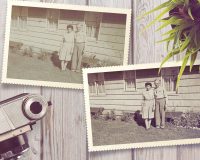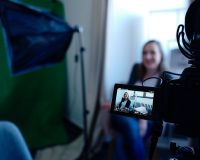While every interviewee is unique in his or her own way, there are several things you can do in advance to help make the process go more smoothly to yield better results. There are also some proven techniques that can be applied during interview sessions to ensure that you get the best possible responses from each subject. These rules apply whether you are putting together an oral history of your family, researching a formal biography, writing an executive tribute or doing a feature article for a company newsletter, web profile, video presentation or printed journal.
First and foremost you need to formulate a central theme or issue and an appropriate line of questions to ask during each interview. You should also plan the logistics of your project carefully to coordinate dates, times and locations as well as any travel arrangements plus special equipment and supplies for recording the session/s on audio, video or even in written form. In other words, know your subject and be prepared.
As part of the preparation process, do proper background research on the individual person or persons, their company or organization if any and the main theme or topic you plan to focus on. This will not only make you better prepared, it will also help you steer or guide the flow of the interview by posing the right questions in the right order to assure that all key points are covered efficiently and thoroughly.
Selecting the right location or setting is also important, regardless of the medium you use to record the interviews. This is especially true for videos but it can also affect the mood of any piece and can make a big difference when putting the subject at ease. In some cases though that may not be your intention. You may want to choose a place that is pivotal to the central issue. An example would be to conduct an interview with a company spokesman at the site where a controversial incident occurred. While this kind of situation is usually associated with journalistic assignments, it can also lend an edge to less confrontational interviews. For instance, recording the remembrances of a war veteran on the field of battle where he fought or at a military cemetery where many of his comrades were laid to rest. In that case, the backdrop itself is a key part of the story and it can add a lot of interest or drama to the interview.
Once you have settled on your central theme, done your homework, compiled your questions and organized everything, it’s time to practice your interviewing techniques. Due to space restrictions, we can’t provide a detailed list of tips here but there is an excellent checklist for the preparation process and a very well thought out section on how to ask questions in an interview on the following web page: http://dohistory.org/on_your_own/toolkit/oralHistory.html. While this article was originally posted as a step-by-step guide to oral history, the same points apply equally to interviews for any purpose in any media.
MORE RELATED LINKS
Media College – Interview Technique
A good online primer for interviewers that covers question preparation, open-ended questions, leading questions and other helpful tips. Also see link to Television Interviews on the page listed above.
Poynter Online – Writing / Editing – Interviewing Bibliography
Another full page of excellent links to additional online resources and recommended books on interviewing.
Stefani Twyford is a personal historian and video biographer sharing life stories, connecting generations and preserving legacies. To learn more, visit her web site, find her on Twitter as @stefanitwyford, visit the Legacy Multimedia Facebook Fan Page, or send her an e-mail.









Thank you for this, Stefani,
It’s exactly what I was looking for!